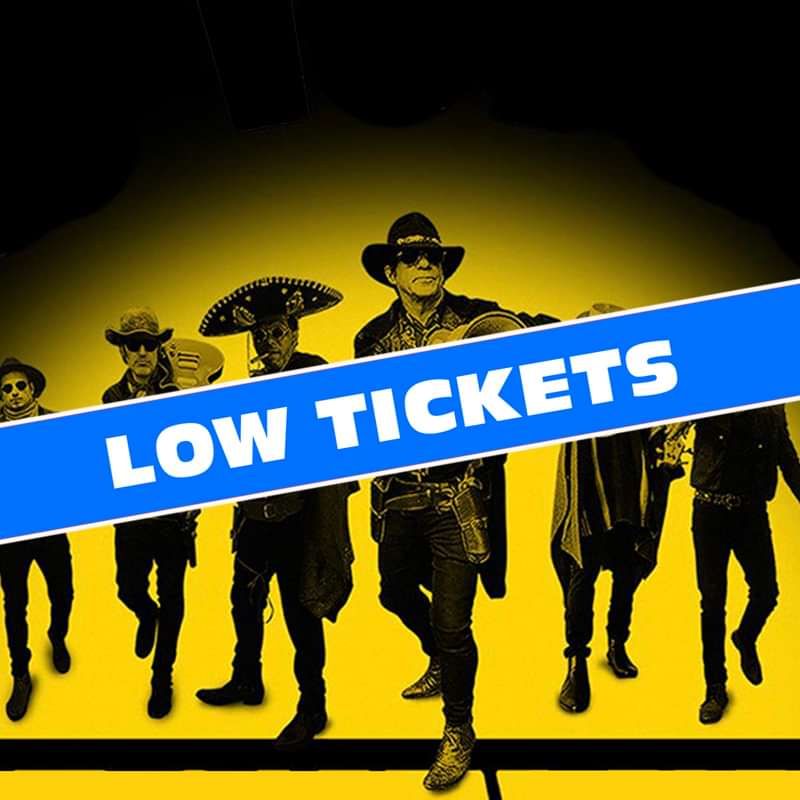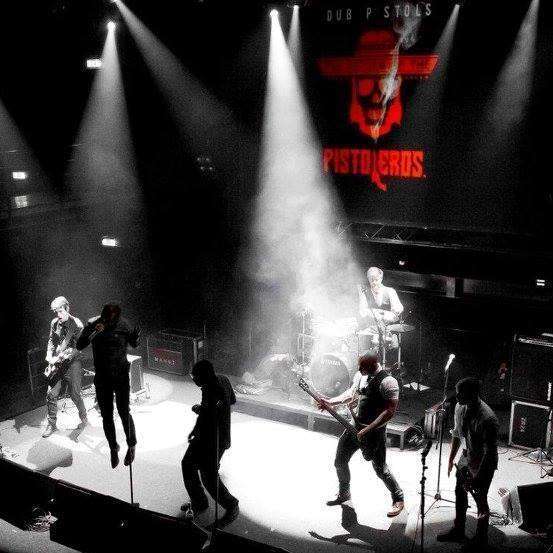
Dub Pistols
+ Frozemode
The Forum presents DUB PISTOLS plus guests Frozemode
Dub Pistols continue to celebrate their Silver Jubilee into 2023.
Not many acts stay together for a quarter of a century and still remain firing on all cylinders. But the Dub Pistols juggernaut rolls on, exploring fresh sonic pastures and accelerating into 2022 — their 25th anniversary, their Silver Jubilee — like there’s no tomorrow.
The Dubs may have had an easier ride of it if they’d been a cartoon band like Gorillaz. There wouldn’t have been assorted band member casualties along the way, for starters, as life on the road took its toll. The multi-cultural collective has involved dozens of artists and musicians over the years — some remaining for years, a few for the duration, and others just popping in for a guest appearance. Their sound has accordingly morphed a variety of times since their inception: taking in dub, punk, jungle, ska, breakbeat, hip-hop and a whole lot more, it’s been a long road travelled.
Throughout an eight-album career and literally thousands of shows, the band has rolled with the punches — enduring setbacks and fuck-ups before piecing themselves back together and morphing into one of the most loved and enduring festival bands on the circuit. Hardest-working band in showbiz doesn’t even cover it.
The genesis of the Dub Pistols began when former club promoter and Deja Vu singer Barry Ashworth started DJing in the mid-90s. Unable to mix records properly at first, Barry got assorted pals to scratch and play horns over the top of his sets. Inspired by the anything-goes attitude of the late 90s genre that came to be called big beat in the UK — acts like the Chemical Brothers, Fatboy Slim and Propellerheads, labels such as Wall Of Sound and Skint — Barry was drawn to start making tracks for his DJ sets, alongside long-term cohort Jason O’Bryan. Polyrhythmic first offering ‘There’s Gonna Be A Riot’ was signed by Concrete Records, and a string of missives followed in its wake — ‘Best Get Better’, the explosive ‘Westway EP’, and then a chipper ‘Cyclone’, which dented the UK national charts.
These singles were bundled together into the ‘Point Blank’ album, and when big-shot US record exec Jimmy Iovine heard it he signed the Dubs to Interscope Geffen for a cool $1.5million. Life was sweet. Then, just as the subsequent ‘Six Million Ways To Live’ long-player was about to drop, the 9/11 terrorist atrocity happened in New York. Given that various album tracks contained explosive references to geo-political events that had seemingly just played out on the international stage, the project was reluctantly shelved. The Dubs had become a fully-fledged band by this stage and had been touring the US extensively while also remixing the likes of Moby, Limp Bizkit and the Crystal Method. But now they had to return to the UK to lick their wounds. With most of their record deal advance blown, they had to rebuild from the ground back up.
Barry had become a decent DJ by this point, and mixed the latest instalment in the acclaimed ‘Y4K’ series for Distinctive Records — blending a mixture of house and breaks tracks by Layo & Bushwacka, the Chemical Brothers, Adam Freeland, Soul Of Man and more. When he finally got the ‘Six Million Ways’ album back off Geffen, Distinctive signed it and led its release rollout with the ‘Problem Is’ single which featured Terry Hall, former singer of 2-Tone legends The Specials.
As the noughties unfolded, Terry Hall started doing shows with the Dubs and featuring on new tracks such as ‘Running From The Thoughts’, ‘Peaches’ and their cover of ‘Rapture’ by Blondie. The rapturous reception Terry received when he appeared with the Dubs alongside his other former Specials bandmate Lynval Golding at the Rise anti-racism festival in London in 2008 was a major factor in The Specials reforming later that year.
Now signed to Sunday Best Recordings, the Dub Pistols by now had become adept at co-opting people into their collective, and for next album ‘Rum & Coke’ they recruited former Freak Power man Ashley Slater, Lindy Layton from Beats International, DJ/producer Justin Robertson and UK hip-hop pioneer Rodney P. Part-recorded in Barbados, where — like their friends Happy Mondays before them — “the wheels fell off the band” while they were out there, according to Barry, it captured the band at the height of their renegade hedonism.
Next album ‘Worshipping The Dollar’ was more political in places, tracks with Akala and Red Star Lion demonstrating how the band still had a social conscience, while rowdy rabble-rouser ‘Mucky Weekend’ — a tale of living for a weekend of excess — was given a first airing. Long-term co-producer Jason O’Bryan left for pastures new as the second decade of the 21st century saw them consolidating their position as festival-rocking favourites, due to a lot of hard graft and touring virtually non-stop. The next two albums, ‘The Return Of The Pistoleros’ and ‘Crazy Diamonds’, reflected their increasingly off-the-chain, exhilarating live shows, with much more jungle/drum & bass incorporated into their dubwise sound and the permanent recruitment of rapper Seanie T into the fold.
Ambitiously, the Dubs threw their first festival in 2019 — Mucky Weekender in the Sussex countryside. Featuring Leftfield, Stanton Warriors, Don Letts, Manasseh Soundsystem and many more, it caught the tail-end of the summer sun and was raved about by all attendees. The success of the first Mucky set it up nicely to become an annual event.
Barry has been very open about his addictions and mental health issues over the years, and in 2019 he did his first Wing Walk — strapped to the top of a bi-plane — to raise money for Tonic Music For Mental Health. This has evolved into an annual Flying Circus fundraiser, involving friends from the music world such as Bez from the Happy Mondays, and Barry has now become a patron of the Tonic organisation.
The Dubs had readied their next album, ‘Addict’, just as the Covid pandemic struck in 2020. The solidarity single ‘Stand Together’ — featuring 2-Tone legend Rhoda Dakar (ex-Bodysnatchers/Special AKA) — dropped just as the Black Lives Matter protests were commencing worldwide, while tracks with soundsystem stalwarts the Ragga Twins, newcomer Natty Campbell and more kept their pot on the boil. The album shot into the top three of the UK dance charts and the top ten of the UK indie charts. But the history of the Dub Pistols is so much more than the sum of their album releases and chart positions — Barry truly has stories for days.
As 2021 began and the pandemic saw little sign of waning, the Dub Pistols released their cover of New Order’s seminal ‘Blue Monday’ on the third Monday of January to raise funds for the Tonic Mental Health Trust. A couple of months later they released their ‘Welcome To The Jungle’ mix album on Jungle Cakes, featuring a whopping 50 tracks by various dubwise jungle associates as well as artists like Deekline, Ed Solo, King Yoof and the Beat Assassins remixing some choice Dub Pistols cuts. This release also shot to the upper reaches of the UK dance charts. Once Covid restrictions were lifted in mid-2021 the Dubs were delighted to get out touring again. They rocked an assortment of festivals and also staged the second iteration of Mucky Weekender, this time on a new site in Hampshire. Groove Armada, Leeroy Thornhill (ex-Prodigy), The Freestylers and the Ragga Twins were just a few of the acts to nice up the dance over the long weekend.
Fast-forward to 2022 and the Dubs are celebrating 25 years of riotous mayhem and righteous marauding with a new album, a documentary, another festival, and a whole lot more. It’s their Silver Jubilee — 25 not out. But who’s counting?

